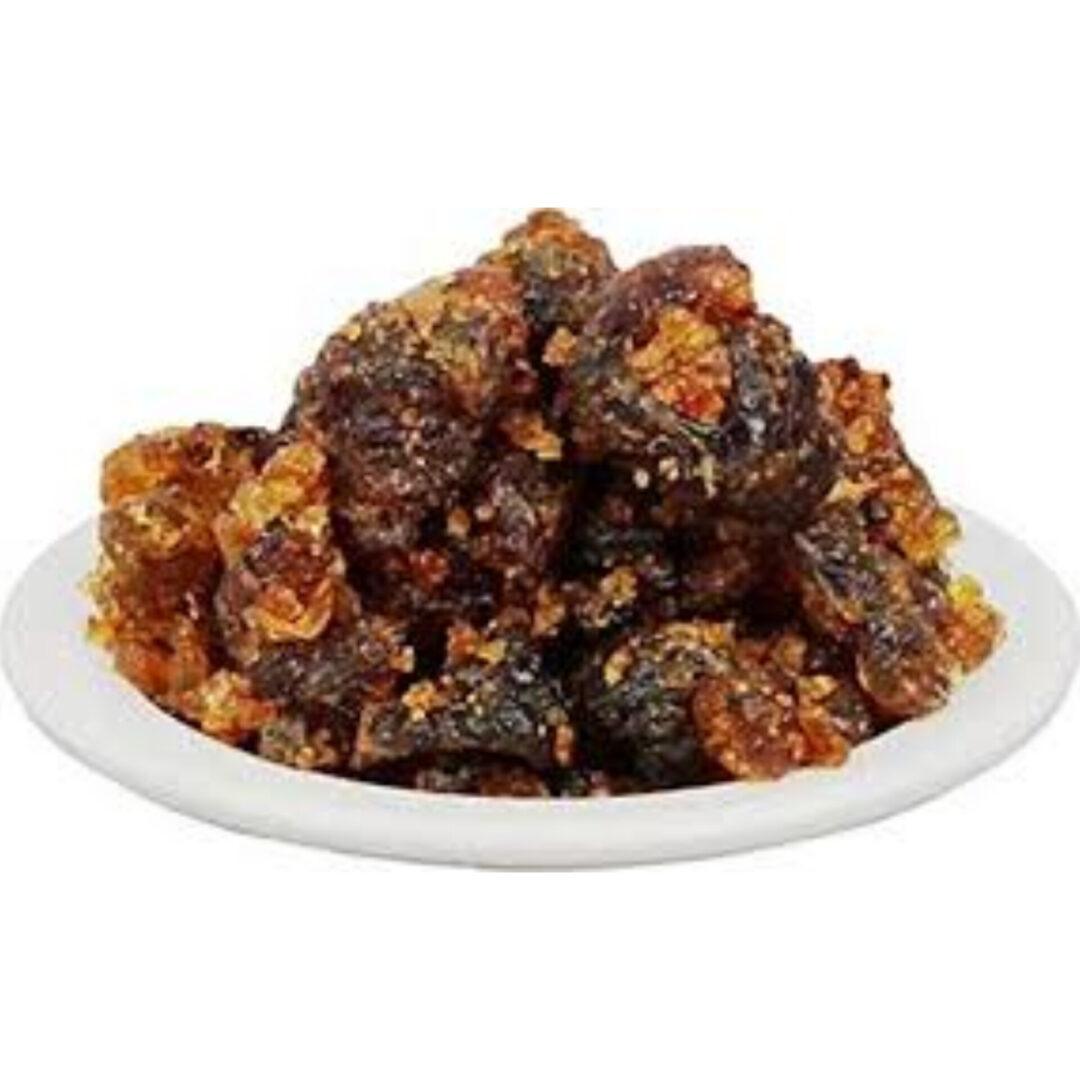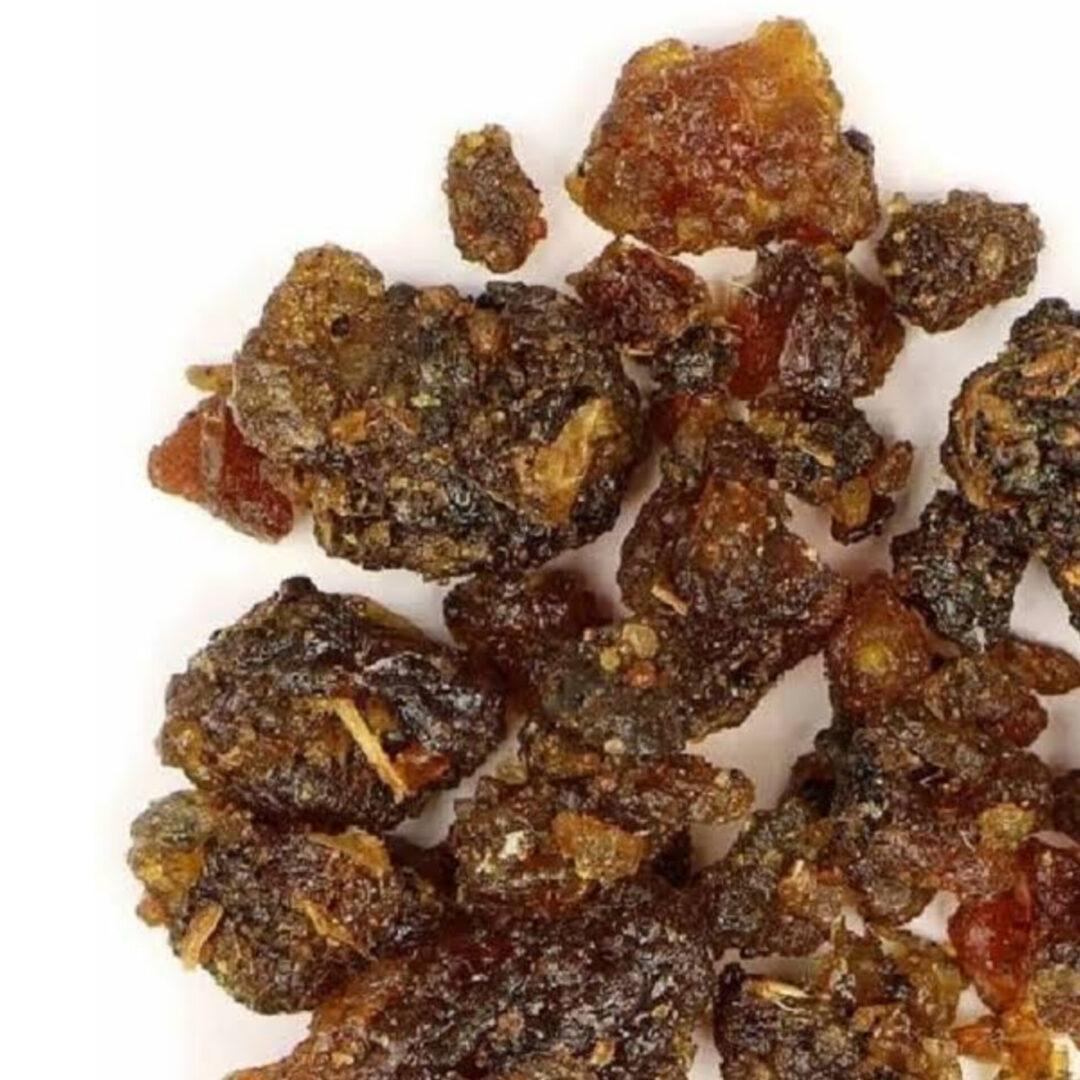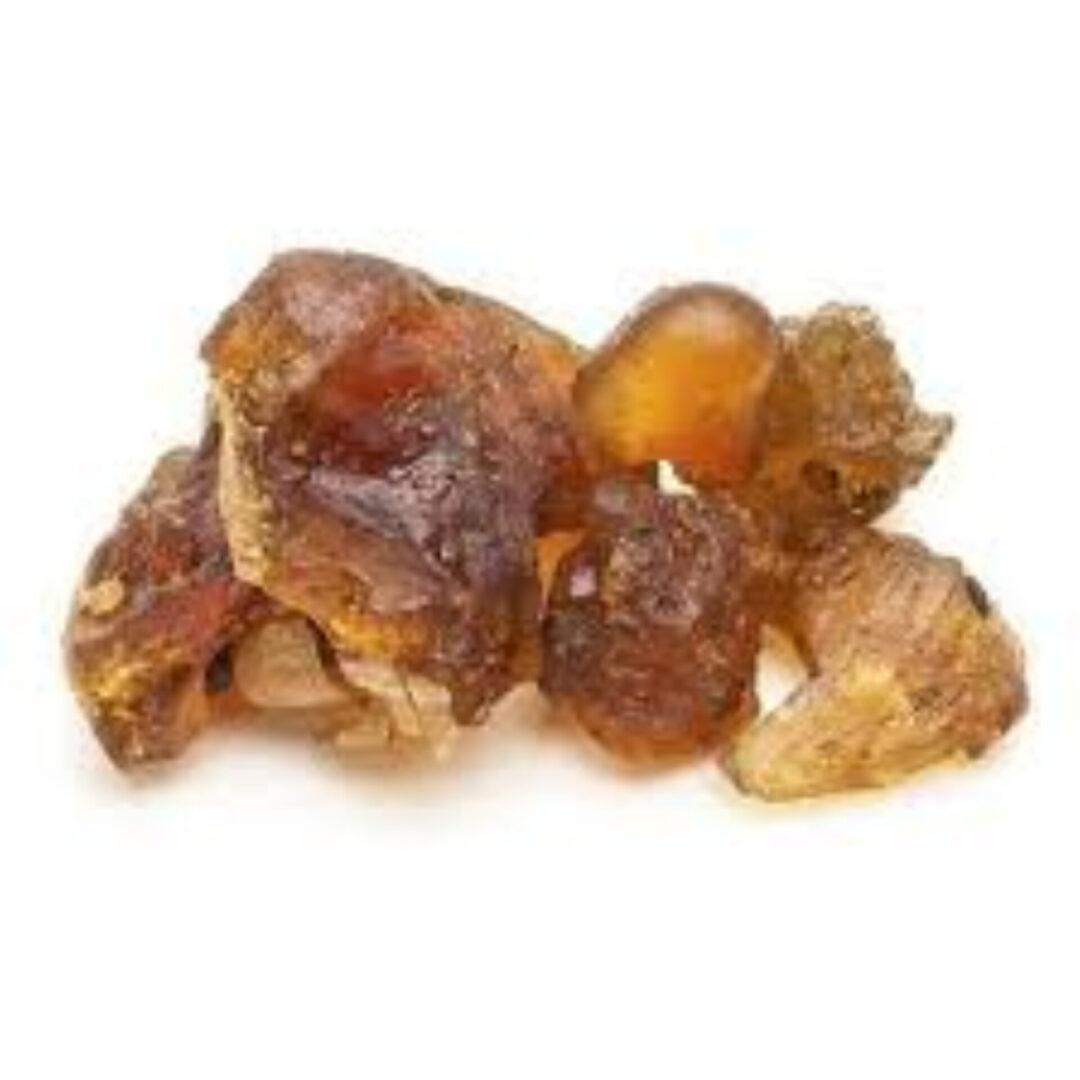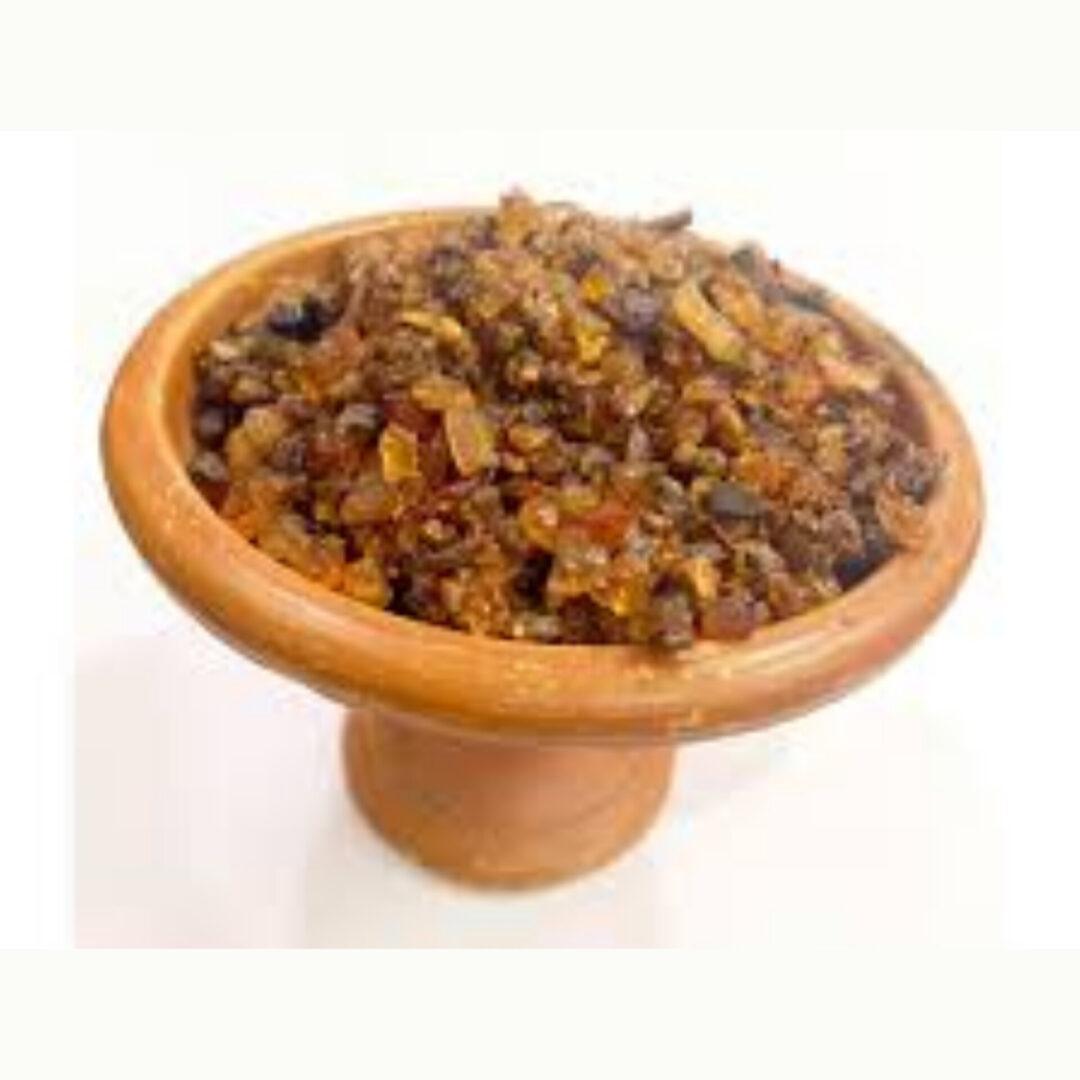In Hinduism, guggul holds religious and ritualistic significance, and it is used in various religious practices and ceremonies. Here are some of its uses in Hindu religion:
- Incense: Guggul resin is commonly used as an ingredient in incense. It is often mixed with other aromatic substances like frankincense (also known as dhoop) to create fragrant incense sticks or cones. Burning these incense sticks during religious ceremonies and prayers is believed to purify the air and create a conducive environment for worship.
- Offerings to Deities: Guggul is sometimes offered to Hindu deities during religious rituals and pujas (worship ceremonies). Devotees may light guggul incense as an offering to the gods and goddesses as a symbol of devotion and reverence.
- Purification: Guggul is considered to have purifying and sanctifying properties. It is used to purify sacred spaces, temples, and idols of deities. The smoke from burning guggul is believed to cleanse the environment of negative energies and impurities.
- Medicinal Uses in Ayurveda: While guggul primarily has religious significance, its traditional use in Ayurvedic medicine for various health benefits also aligns with the holistic approach to well-being in Hinduism. Ayurveda, as an ancient system of medicine, is intertwined with Hindu culture and philosophy.
- Spiritual Significance: Some practitioners of Hinduism believe that guggul has spiritual significance and can aid in meditation and spiritual practices. The soothing fragrance of guggul incense is thought to help create a serene and focused atmosphere for meditation and reflection.
- Yagnas and Havans: Guggul may be used as an ingredient in yagnas (fire rituals) and havans (sacred fire ceremonies) to invoke divine blessings and appease deities. It is offered into the sacred fire as part of these rituals.
- Protection: Guggul is sometimes associated with protection from negative forces and malevolent spirits. Burning guggul is believed to ward off evil influences and bring blessings from the gods.
It’s important to note that the use of guggul in Hindu religious practices and rituals can vary by region and tradition. Different sects and schools of Hinduism may have their unique customs and beliefs regarding the use of guggul. As with any religious or cultural practice, the significance and symbolism of guggul can have diverse interpretations within the Hindu faith.
“guggal” or “guggul,” which is a resin obtained from the sap of the Commiphora wightii tree, native to India, Bangladesh, and Pakistan. Guggul has been used for centuries in traditional Ayurvedic medicine for its various therapeutic properties. Here are some key points about guggul:
- Resin: Guggul is harvested from the gum resin of the Commiphora wightii tree. The resin is tapped from the tree’s bark and then processed into various forms, including gum, extracts, and capsules.
- Medicinal Uses: Guggul has been traditionally used in Ayurvedic medicine to treat a range of health conditions. Some of its purported medicinal uses include managing cholesterol levels, reducing inflammation, aiding weight loss, and promoting overall well-being.
- Cholesterol Management: Guggul is perhaps most well-known for its potential to lower cholesterol levels. Some studies suggest that guggulsterones, the active compounds in guggul, may help reduce bad LDL cholesterol and triglycerides while increasing good HDL cholesterol levels.
- Anti-inflammatory Properties: Guggul has anti-inflammatory properties, which can be useful in managing conditions like arthritis. It is believed to inhibit the production of certain pro-inflammatory substances.
- Weight Management: Guggul is sometimes included in weight loss supplements due to its potential to enhance metabolism and help with fat burning. However, its effectiveness for weight loss varies among individuals.
- Antioxidant Effects: Guggul contains antioxidants that can help protect cells from damage caused by free radicals. This may contribute to its overall health benefits.
- Safety and Side Effects: Guggul is generally considered safe when used as directed. However, it can interact with certain medications and should not be used by pregnant or nursing women. Some people may experience side effects like gastrointestinal upset, skin rash, or headache.
- Dosage: The appropriate dosage of guggul can vary depending on the specific product and individual health needs. It is important to follow the dosing recommendations on the product label or consult with a healthcare professional.
- Research and Controversy: While guggul has been used for centuries in Ayurvedic medicine, more research is needed to fully understand its effectiveness and safety for various health conditions. Some studies have shown positive effects, while others have been inconclusive.
Before using guggul or any herbal remedy, it’s essential to consult with a healthcare provider, especially if you have underlying health conditions or are taking other medications. They can provide guidance on its appropriateness for your specific situation and potential interactions with other drugs.
“Guggul” is the common name for the resin obtained from the Commiphora wightii tree, and its name generally remains consistent across regions and languages in India. While the term “guggul” may be used across India to refer to this resin, the way it is pronounced might vary slightly depending on the local language and dialect. Here are how the term “guggul” might be pronounced in some of India’s major languages:
- Hindi: In Hindi, it is also known as “गुग्गुल” (pronounced as “guggul”).
- Marathi: In Marathi, it is called “गुग्गुल” (pronounced as “guggul”).
- Tamil: In Tamil, it may be referred to as “குக்குள்” (pronounced as “kukkul”).
- Telugu: In Telugu, it might be called “గుగ్గులు” (pronounced as “guggulu”).
- Kannada: In Kannada, it could be referred to as “ಗುಗ್ಗುಲು” (pronounced as “guggulu”).
- Bengali: In Bengali, it may be known as “গুগ্গুল” (pronounced as “guggul”).
- Gujarati: In Gujarati, it could be referred to as “ગુગ્ગલ” (pronounced as “guggul”).
- Punjabi: In Punjabi, it might be called “ਗੁੱਗਲ” (pronounced as “guggul”).
- Malayalam: In Malayalam, it may be known as “ഗുഗ്ഗുല്” (pronounced as “guggulu”).
- Oriya: In Odia, it could be referred to as “ଗୁଗ୍ଗୁଲ” (pronounced as “guggula”).
Please note that the pronunciation can vary within these languages depending on regional dialects. However, the term “guggul” remains relatively consistent in its representation across India, primarily due to its use in traditional Ayurvedic medicine, which relies on standardized terminology for medicinal substances.






Reviews
There are no reviews yet.